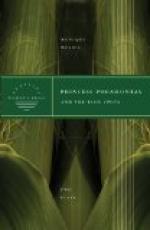And Smith, though he doubted somewhat, did not feel certain that Powhatan was not speaking the truth. But Pocahontas, still in hiding, knew well that no man in Werowocomoco would have dared shoot at the white men except by direct order of their werowance.
Perhaps, however, all was now well; perhaps her father had at least realized that the Englishmen were not to be caught napping. She looked on while Powhatan and Smith superintended the placing of the great piles of stores in the boat and the refilling of the baskets with the goods with which the Englishmen paid for them.
Then, their work over, the Indians began to deck themselves out in the beads and cloths. While they were thus occupied a man came running and dropped down exhausted before Powhatan, able to gasp out a couple of words only. Though the messenger had not breath enough to cry them out, they were heard by the Indians standing nearby and shouted aloud. Immediately the crowd jumped to their feet and uttering loud shrieks, danced up and down and around in circles, to the sound of rattles and drums.
“What is the meaning of all this, Smith?” asked Russell, who with the other white men stood watching the strange performance.
“Tell them, my son,” said Powhatan, understanding from the tone of the Englishman’s voice that his words were a question, “that two score of my braves, among them Nautauquas and Claw-of-the-Eagle, have won a great victory over one hundred of our enemies, and that this is our song of triumph.”
The old chief’s eye shone more brightly than ever, and his back was as firm and straight as that of one of his sons.
“I shall soon have witnessed all their different dances,” John Smith confided to Russell, when he had repeated Powhatan’s explanation. “There lacks now only the war dance.”
There was a pause in the dance; then Powhatan gave a signal. Drums and rattles started up once more. The rhythm was a different one, even the white men could tell this; and they noticed that the savages moved more swiftly as if animated by the greatest excitement. Fresh dancers, their faces and bodies painted in red and black, took the places of those who fell from fatigue, and the woods resounded with their loud song.
“It must have been a great victory,” suggested Ratcliffe, “to have excited them in this manner.”
But Pocahontas’s heart beat as if it were the war drum itself, for she knew what the white men did not know, that this last was a war dance; but she was not yet certain against whom her tribe was to take the war-path. She must wait and see.
At last the dancing ceased and the feasting began, and the Englishmen still watched with interest the “queer antics” of the savages, as they called them. All was now so peaceful that they laid aside their weapons, setting a guard to watch them, and sitting about the great fire they had built in the lodge, waited for the morning’s high tide to lift their boat out of the half-frozen ooze in which the ebb had left it. Powhatan and the Indians had withdrawn, but the werowance had sent a messenger with a necklace and bracelet of freshwater pearls with words of affection for “his son” and to say that he would shortly send them supper from his own pots, that they might want for nothing that night.




